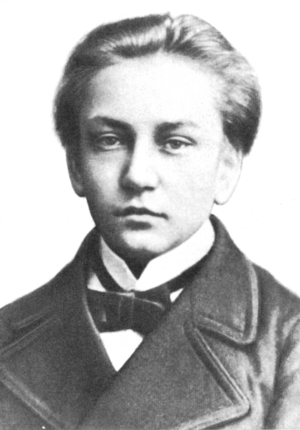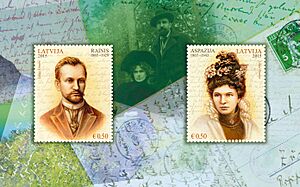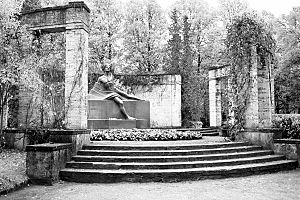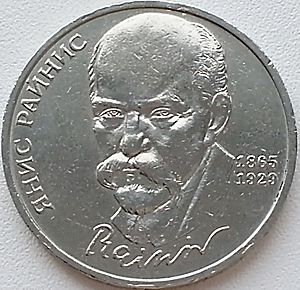Rainis facts for kids
Quick facts for kids
Jānis Pliekšāns
|
|
|---|---|
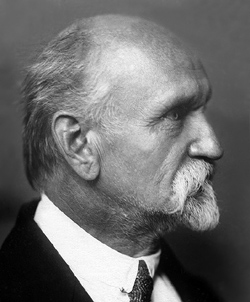 |
|
| Born | 11 September 1865 "Varslavāni" farm, Dunava parish, Courland Governorate, Russian empire
|
| Died | 12 September 1929 (aged 64) Majori, Latvia
|
| Occupation | Poet Playwright translator politician |
| Spouse(s) | Aspazija |
| Awards | Order of the Three Stars, 1st class (1925) |
Rainis was the pen name of Jānis Pliekšāns (born September 11, 1865 – died September 12, 1929). He was a famous Latvian poet, playwright (someone who writes plays), translator, and politician.
Rainis wrote many important works. These include the classic plays Uguns un nakts (which means Fire and Night, from 1905) and Indulis un Ārija (from 1911). He also translated Goethe's famous play Faust. His writings greatly influenced the Latvian language. The symbols he used in his main works were very important for Latvian nationalism, which is a strong feeling of pride in one's country.
Contents
Early Life and Education
Rainis was born on a farm called "Varslavāni" in Dunava parish, which is in Jēkabpils municipality. His father, Krišjānis Pliekšāns, was a tenant farmer, meaning he rented land to farm. His mother was Dārta. Rainis had two sisters, Līze and Dora.
While studying at the Riga City Gymnasium, he became friends with Pēteris Stučka. Pēteris later married Rainis's sister Dora. He also became a well-known Latvian communist leader.
Starting His Career
Rainis studied law at the University of St. Petersburg. He shared a room with Pēteris Stučka there. Even as a student, Rainis was already collecting folk songs. He also wrote poems that were sometimes funny or serious, and he translated books.
With Stučka, he helped edit a collection of short, witty poems and jokes called Mazie dunduri (The Small Gadflies). They also published Apdziedāšanas dziesmas (Mocking Songs) about the third All-Latvian Song Festival. Later, Rainis and Stučka went their separate ways because they had different ideas about socialism and communism.
After finishing his studies, Rainis worked in courts in Vilnius and Jelgava. He also wrote for newspapers like Dienas Lapa (The Daily Page) and Tēvija (Fatherland). He also contributed to the Latvian Conversational Dictionary.
From 1891 to 1895, Rainis was the main editor of Dienas Lapa. This newspaper was a meeting place for young Latvian thinkers who were interested in liberal and socialist ideas. They were known as the New Current. After attending a big meeting of socialist groups in 1893, Rainis started to focus more on socialist ideas in Dienas Lapa. Many people see him as the founder of Latvian socialism.
During this time, he met Aspazija, another Latvian poet and playwright. She was also part of the New Current. According to the Encyclopedia Britannica, while editing the paper, Rainis developed his own way of thinking. He believed life was a constant change of energy, not just about material things.
Because the New Current criticized society and asked for changes, the government saw them as a threat. In 1897, Rainis was arrested. He was sent away, first to Pskov, and then to a distant area called Vyatka guberniya (now Kirov Oblast). During this time away from home, Rainis translated Faust and other classic books. He also wrote his first collection of poems, Tālas noskaņas zilā vakarā (Far-Off Moods on a Blue Evening, published in 1903).
Besides Faust, Rainis also translated works by famous writers like William Shakespeare, Friedrich Schiller, Heinrich Heine, and Aleksandr Pushkin into Latvian. These translations helped make the Latvian language richer by adding new words.
Living in Exile
Rainis was also very active in politics. He was one of the main leaders of the Revolution of 1905 in Latvia. When the revolution failed, he and his wife Aspazija moved to Switzerland. They settled in Castagnola, near Lugano.
While living in another country, Rainis wrote many works:
- Plays: Zelta Zirgs (The Golden Horse), Jāzeps un viņa brāļi (Joseph and His Brothers), Spēlēju, dancoju (I Played, I Danced), Daugava (The Daugava, 1916), and Ģirts Vilks.
- Poetry: Klusā grāmata (The Quiet Book), Vēja nesta lapas (Leaves Upon the Wind), Tie, kas neaizmirst (Those, Who Do Not Forget), Gals un sākums (The End and the Beginning), Ave sol, and Sveika, brīvā Latvija (Hello, Free Latvia).
His dramatic poem Daugava included the first clear demand for Latvia to be an independent country. He wrote:
Land, land, what is that land demanded in our song? Land, that is a state.
These lines were removed by the government when the work was first published in Moscow. But after the defeat of Bermondt-Avalov's forces in November 1919, Daugava was performed at the National Theater. This was to celebrate the first anniversary of Latvia becoming independent. Many soldiers carried this work with them into battle.
During his time away, Rainis published more works like Gals un sākums (End and Beginning, 1912). These works used symbols about politics and revolution. They also used ideas from Hegelian philosophy. He also wrote plays that connected Latvian folklore (traditional stories) with the country's modern political struggles.
Coming Back to Latvia
Rainis and Aspazija returned to Latvia on April 4, 1920. They were welcomed as heroes. They had been like spiritual leaders for Latvia's fight for independence.
Rainis became active in politics again. He was a member of the Latvian Social Democratic Workers' Party. He served in the Constitutional Assembly of Latvia (Satversmes sapulce) and the Saeima (Parliament). He also worked in the Ministry of Education's Arts Department. He helped start and lead the Dailes Theater and was director of the Latvian National Theatre from 1921 to 1925. From December 1926 to January 1928, he was the Minister of Education. He was also a member of the Cultural Fund and the Order of Lāčplēsis Council.
During this period, he wrote:
- Plays: Iļja Muromietis (Ilya Muromets), Mīla stiprāka par nāvi (A Love Stronger Than Death), Rīgas ragana (The Witch of Riga).
- Poetry: Treji loki, Sudrabota gaisma (A Silvery Light), Mēness meitiņa (Moon Girl), Zelta sietiņš (The Gold Strainer), and others.
- Memoirs: Kastaņjola (Castagnola), which are his memories from his time in exile.
Rainis hoped to become Latvia's president. When this did not happen, he became less involved in politics.
In the 1920s, Rainis was considered for a Nobel Prize in Literature. His personal journals from these years show how much he wanted this international award. They also show his disappointment when he never received it. However, Rainis did receive one of Latvia's highest awards. He became one of the first people to get the Commander Grand Cross of the Order of the Three Stars on February 28, 1925.
Rainis passed away in Majori in 1929.
Rainis's Legacy
Several of Rainis's poetry collections were published after his death. These include Sirds devējs, Dvēseles Dziesma, Lielās līnijas, and Aizas ziedi.
A statue of Rainis stands in Esplanāde in Riga. It is a popular meeting place. It also shows how his many different works and his life are understood in different ways. The national poetry festival is held there every year on his birthday. The statue is also important for groups on the left side of politics, from Social Democrats to those who oppose Latvia's education reforms. This is partly because Rainis supported schools for minority groups. He helped start Belarusian schools in Latvia.
People's opinions of his work have often been influenced by politics. For example, the Soviets highlighted his socialism. His picture even appeared on a special Soviet ruble coin. Being buried near Rainis's grave in Rainis' Cemetery in Riga was a great honor for high-ranking Soviet military members. However, his patriotic works like Daugava were left out of his books published before the Third Latvian National Awakening.
See also
 In Spanish: Rainis para niños
In Spanish: Rainis para niños
 | Tommie Smith |
 | Simone Manuel |
 | Shani Davis |
 | Simone Biles |
 | Alice Coachman |


